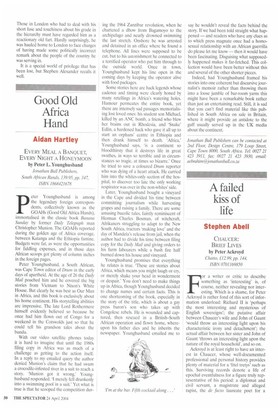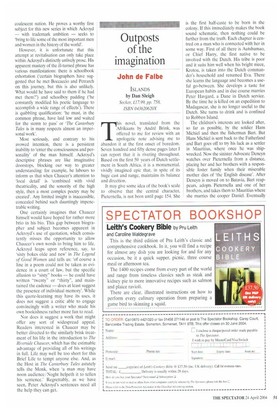A failed kiss of life
Stephen Abell
CHAUCER: BRIEF LIVES by Peter Ackroyd Chatto, £12.99, pp. 144, ISBN 0701169850 For a writer or critic to describe something as 'interesting' is, of course, neither revealing nor interesting. Which is a shame, for Peter Ackroyd is rather fond of this sort of information underload: Richard II is 'perhaps the most interesting and mysterious of English sovereigns': the putative affair between Chaucer's wife and John of Gaunt 'would throw an interesting light upon his characteristic irony and detachment': the actual affair between her sister and John of Gaunt 'throws an interesting light upon the nature of the royal household', and so on. Ackroyd is at least right to have an interest in Chaucer, whose well-documented professional and personal history provides plenty of material for a `litel tretys' such as this. Surviving records denote a life of epochal eventfulness for a figure truly representative of his period: a diplomat and civil servant, a magistrate and alleged rapist, the de facto laureate poet for a
coalescent nation. He proves a worthy first subject for this new series in which Ackroyd — with trademark ambition — seeks to 'bring to life some of the most important men and women in the history of the world'.
However, it is unfortunate that this attempt at revitalisation can only take place within Ackroyd's distinctly unlively prose. His apparent mastery of the ill-turned phrase has various manifestations: there is schoolbook exhortation ('certain biographers have suggested that he met Boccaccio and Petrarch on this journey, but this is also unlikely. What would he have said to them if he had met them?) and schoolboy padding ('he constantly modified his poetic language to accomplish a wide range of effects'). There is quibbling qualification: 'he must, in the common phrase, have laid low and waited for the storm to pass' or 'The Canterbury Tales is in many respects almost an impersonal work'.
Most seriously, and contrary to his avowed intention, there is a persistent inability to 'enter the consciousness and personality' of the man himself. Ackroyd's descriptive phrases are like imaginative doorstops, blocking our way to greater understanding: for example, he labours to inform us that when Chaucer's attention to 'local detail' is 'combined with vivid theatricality, and the sonority of the high style, then a most complex poetry may be created'. Any limited insight is inaccessible, concealed behind such dauntingly impenetrable writing.
One certainly imagines that Chaucer himself would have hoped for rather more brio in his bio. This gap between biographer and subject becomes apparent in Ackroyd's use of quotation, which consistently misses the opportunity to allow Chaucer's own words to bring him to life. Ackroyd leaps upon reference, say, to 'sixty bokes olde and new' in The Legend of Good Women and tells us: 'of course a line in a poem could not be taken as evidence in a court of law, but the specific allusion to "sixty" books — he could have written "twenty" or "thirty", and maintained the cadence — does at least suggest the presence of individual memory'. While this quote-learning may have its uses, it does not suggest a critic able to engage convincingly with a writer who made his own bookishness rather more fun to read.
Nor does it suggest a work that might offer any sort of widespread appeal. Readers interested in Chaucer may be better directed to the similarly brisk treatment of his life in the introduction to The Riverside Chaucer, which has the estimable advantage of providing all of his writings in full. Life may well be too short for this Brief Life to tempt anyone else. And, as the Host in The Canterbury Tales astutely tells the Monk. when 'a man may have noon audience / Noght helpeth it to tellen his sentence.' Regrettably, as we have seen, Peter Ackroyd's sentences need all the help they can get.



















































































 Previous page
Previous page